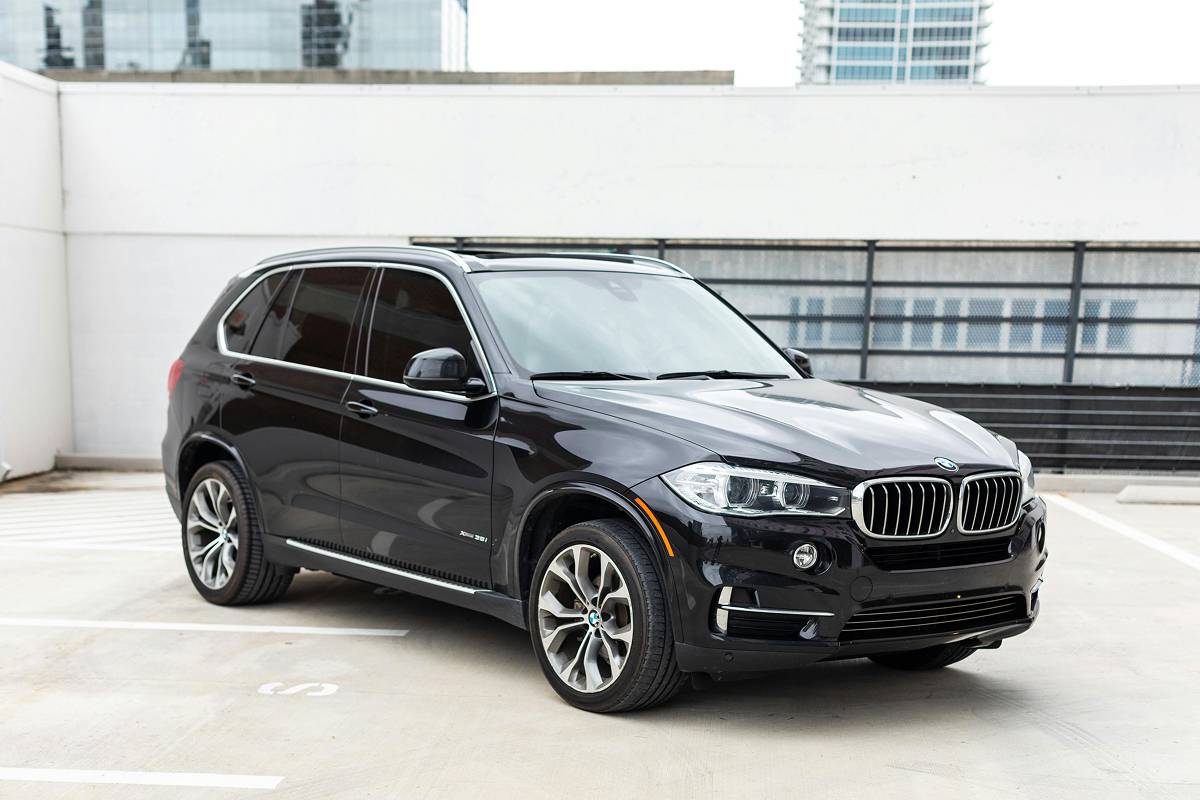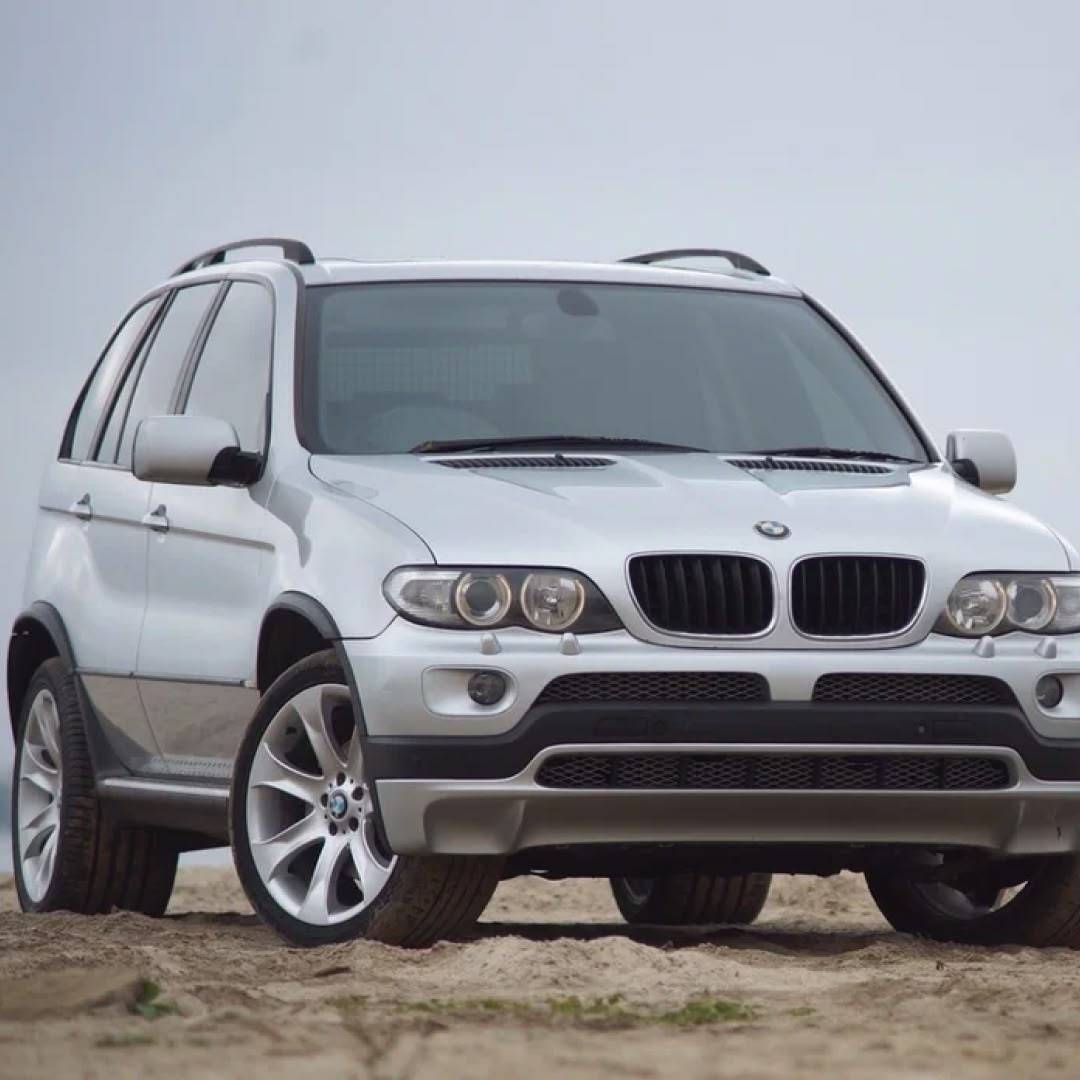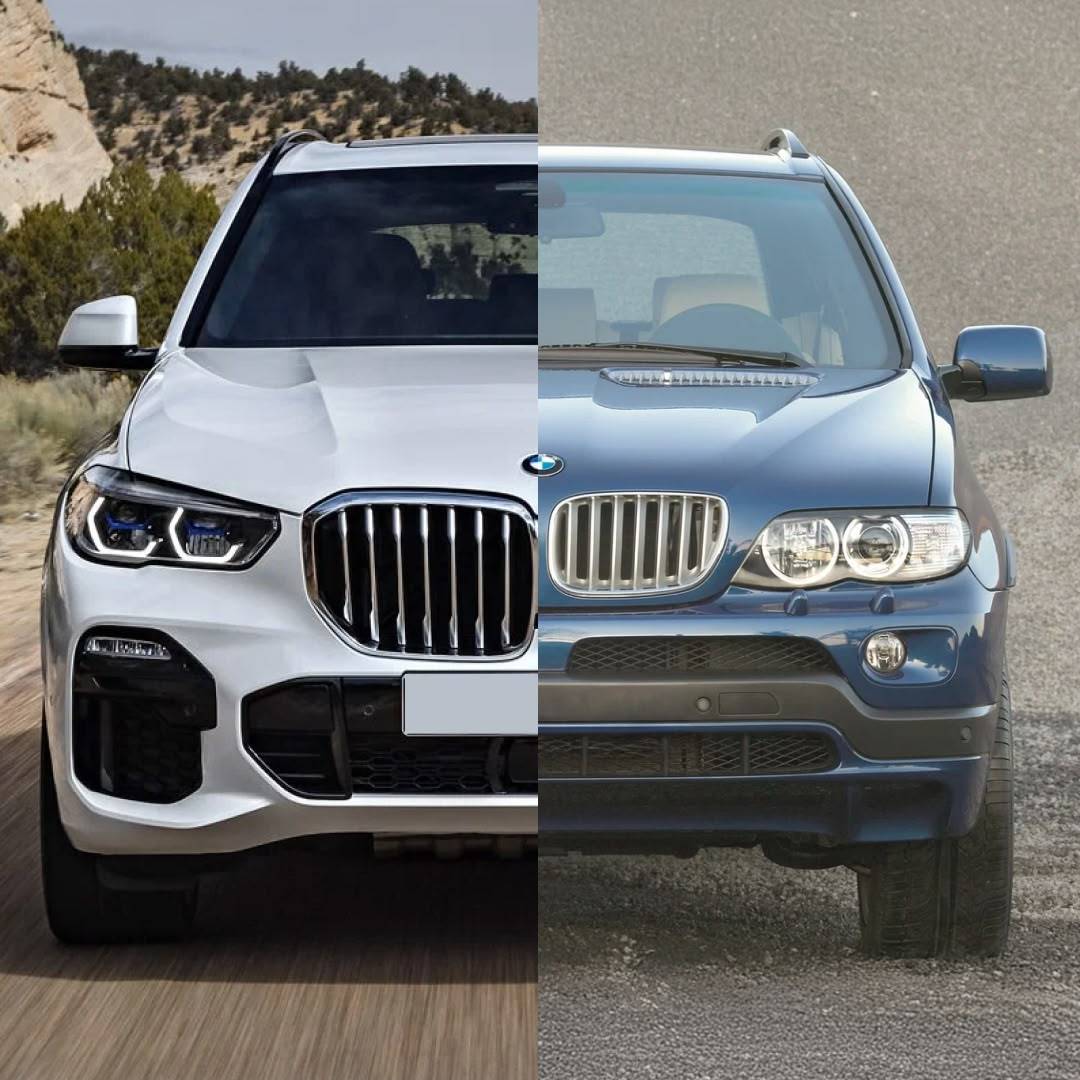[[post.title]]
We're changing for you!
Check out our new website
We're changing for you!
Check out our new website
May 29, 2025

Ah, the ubiquitous box on wheels, a.k.a. the SUV. Nobody really knows when the craze started, but it’s been on for years and doesn’t seem to be going anywhere, whether you like it or not. Regardless of your attitude towards this car body style, you’ve gotta hand it to the Bavarians and their main take on the trend, the BMW X5 – it’s in a class of its own.
Let’s take a closer look at how it combines sporty handling with family hauling practicality.
 The BMW X5 made its debut in 1999 as BMW's first foray into the SUV market, though calling it the "first" SUV EVER might raise some eyebrows among Range Rover purists. What made the X5 revolutionary was its Sports Activity Vehicle (SAV) concept – BMW's fancy way of saying "we made an SUV that doesn't drive like a truck."
The BMW X5 made its debut in 1999 as BMW's first foray into the SUV market, though calling it the "first" SUV EVER might raise some eyebrows among Range Rover purists. What made the X5 revolutionary was its Sports Activity Vehicle (SAV) concept – BMW's fancy way of saying "we made an SUV that doesn't drive like a truck."
Built on a unibody platform rather than traditional body-on-frame construction, the BMW X5 delivered car-like handling dynamics that left competitors scrambling to catch up. Under the hood, the first generation (codename: E53) offered a range of powertrains:
Interested in the origins of this ingenious vehicle? Make sure to watch our short documentary about the History of the BMW X5. It covers everything from its development to its impact on the luxury SUV segment.
Back to the specs: in its most modern guise—codenamed the G05—the X5 has even more powertrains available, ranging from a 2.0 L BMW B48 straight-four to a 4.4 L BMW S68 V8. If you want to learn more about the current BMW X5 lineup (as of May 2025), check out the table below.
| Model | Engine | Power | Torque |
| X5 sDrive40i | 3.0 L straight-six | 375 hp | 398 lb-ft |
| X5 xDrive40i | 3.0 L straight-six | 375 hp | 398 lb-ft |
| X5 xDrive50e | 3.0 L straight-six + EV motor | 483 hp | 516 lb-ft |
| X5 M60i | 4.4 L V8 | 523 hp | 553 lb-ft |
| X5 M Competition | 4.4 L V8 | 617 hp | 553 lb-ft |
The BMW X5 (G05) measures approximately 194.2 inches (4.93 m) in length, 78.9 inches (2.00 m) in width, and 69.1 inches (1.76 m) in height. It has seating for up to seven passengers (depending on configuration) and a trunk capacity of around 22.9 cubic feet (650 L).
Of course, that latter value only concerns the non-hybrid models. What about the other…
 Obviously, the BMW X5 lineup caters to users with different needs.
Obviously, the BMW X5 lineup caters to users with different needs.
The BMW X5 sDrive40i serves as the entry point, featuring a 3.0-liter turbocharged inline-six that produces 375 hp transferred to the rear wheels only. This variant strikes an excellent balance between performance and efficiency, if you even consider something like that when buying such a tall vehicle. There is also an all-wheel drive version paired to the same engine, which uses the BMW xDrive system – it sacrifices the MPG a bit for much better traction.
If you insist on having a “fuel efficient” SUV, the two following versions might be better for you.
Following industry trends toward electrification, the BMW X5 xDrive50e plug-in hybrid combines a turbocharged inline-six with an EV motor. As mentioned in the table earlier, it pumps out a combined 483 hp and 516 lb-ft of torque. According to the official claims, this variant offers approximately 64 miles of electric-only range.
Unfortunately, what you gain in MPG and EV-only capabilities, you lose in trunk capacity and driving dynamics, compared to the regular inline-six version. In the BMW X5 Hybrid, you’ll be able to carry almost 5 cubic feet of luggage less (down to approximately 17.6 cubic feet or 500 L) than in the 40i.
The PHEV is also heavier, hence the worse handling – it weighs 5573 lbs, over 500 lbs more than the base model (up from 4919 lbs). That’s almost a 100 lbs more than the X5 M Competition, more on which later.
Hypermiling freaks from Europe also enjoy access to Diesel variants that combine impressive torque delivery with remarkable fuel efficiency. The Diesel BMW X5 models are the perfect solution for those who want to tow their boat to the marina without stopping for fuel every 600 miles or so.
Yup, these are the ranges they are easily capable of. The entry Diesel version called BMW X5 xDrive30d offers a combined mileage of 32.7 MPG, according to manufacturer's claims. That’s even more impressive if you consider how it weighs 5059 lbs, delivers 294 hp, and moves pretty quickly when you need it to.
But what if you need even more horsepower?
When regular X5 variants feel too civilized, the BMW X5 M Competition arrives with 617 hp and 553 lb-ft of unapologetic excess, reaching 60 mph in just 3.7 s. This isn't just an SUV with a powerful engine – it's a complete reimagining of what a family vehicle can be.
The X5 M Competition features adaptive suspension, carbon ceramic brakes, and a sport-tuned exhaust that announces your arrival long before you pull into your driveway. It's kind of the equivalent of bringing a Formula 1 car for a grocery run – completely unnecessary, but too fun to pass on.
A younger sibling of the X5, the BMW X3 represents a different approach to the luxury SUV segment, targeting other buyer preferences and family sizes. It’s smaller, measuring 185.9 inches in length, 74.4 inches in width, and 66 inches in height.
| Dimension | BMW X5 | BMW X3 | Difference |
| Length | 194.2 inches | 185.9 inches | ↓ 8.3 inches |
| Width | 78.9 inches | 74.4 inches | ↓ 4.5 inches |
| Height | 69.1 inches | 66 inches | ↓ 3.1 inches |
This size difference translates to more interior space and cargo capacity in the X5, making it better suited for larger families.
Performance-wise, the BMW X5 offers more powerful engine options, including V8 variants that aren't available in the BMW X3 lineup. The larger platform also allows for more sophisticated suspension tuning, resulting in a smoother ride quality that passengers will appreciate during extended trips.
Price reflects these differences too, with the BMW X5 commanding a significant premium over the X3 – $68,600 to $49,950 MSRP for the cheapest xDrive variant. Consider the X3 if you want BMW luxury in a more manageable package, but choose the X5 if you need maximum space and don't mind the extra cost.
The BMW X5's reliability story varies significantly by generation, with newer models generally offering better dependability than their predecessors. Earlier generations, particularly the E53 (1999–2006), earned mixed reliability ratings due to issues with cooling systems, window regulators, and electronic components. The E70 generation (2007–2013) improved in some areas while introducing new problems with the addition of more complicated technology.
The current G05 generation (2019–present) represents BMW's most reliable X5 yet, benefiting from improved manufacturing processes and more mature powertrains. After all, it gets their best six-banger to date, the BMW B58 engine. However, as with any luxury vehicle, electronic components and suspension parts remain common wear items as mileage accumulates.
BMW X5 models feature their battery in the cargo area rather than under the hood, which can confuse owners during emergency situations. Unless you’ve previously owned a BMW and know to look for the battery in the trunk. To jump start your X5, locate the positive terminal (marked with a red cover) and connect the positive jumper cable here rather than directly to the battery.
Connect the negative cable to a solid ground point in the engine bay, start the assisting vehicle, wait a few minutes, then attempt to start your X5. This process protects the vehicle's sensitive electronics while providing the necessary power boost.
Always consult your owner's manual for specific procedures, as different model years may have slight variations in jump starting protocols.
The X5 excels in scenarios where versatility matters: it handles school runs with dignity, weekend getaways with comfort, and occasional spirited driving with enthusiasm. Its commanding driving position, refined interior, and solid build quality make it a standout proposition in the segment. Especially for those who value driving dynamics and are prepared for higher cost of ownership connected to premium vehicles.
Looking to enhance your driving experience? Decode your VIN to check out all of the BMW X5 upgrades on our website or read our in-depth guide on improving this platform’s usability and capabilities: Upgrading the BMW X5 – All you need to know. This way, you’ll make sure to get the most from your luxury SUV investment.
The BMW X5's reliability varies by generation, with current models showing improvement over earlier versions. Proper maintenance and prompt attention to issues are essential for long-term dependability.
Yes, the BMW X5 offers an optional third row of seats in most configurations, providing seating for up to seven passengers when specified.
Yes, all BMW X5 models come standard with xDrive all-wheel drive system, providing improved traction and stability in various driving conditions.
BMW X5 pricing starts around $68,600 for base models, with high-performance variants like the M Competition exceeding $127,000 when fully equipped.
The BMW X5 battery is located in the cargo area under the floor panel, rather than in the traditional engine bay location.
The BMW X5 weighs around 4,900–5,500 lbs depending on the specific model and equipment level.
The most reliable BMW X5 models tend to be from the current G05 generation (2019–present), which benefits from improved manufacturing and more mature powertrains.
The BMW X5 xDrive40i features the B58 turbocharged inline-six engine, known for its balance of performance and reliability.
Early E70 models (2007–2010) had some teething issues with electronics and should be approached with caution on the used market.
The BMW X5 fuel door releases electronically via a button located on the driver's side door panel or through the central locking system.
Customer Reviews
Comments
Rate the product
This email is already registered.
Please Log In to continue.
Let us find
the right version for you
We'll confirm pricing, compatibility and product details for your car:
Enter your VINThe BMW X5's reliability varies by generation, with current models showing improvement over earlier versions. Proper maintenance and prompt attention to issues are essential for long-term dependability.
Yes, the BMW X5 offers an optional third row of seats in most configurations, providing seating for up to seven passengers when specified.
Yes, all BMW X5 models come standard with xDrive all-wheel drive system, providing improved traction and stability in various driving conditions.
BMW X5 pricing starts around $68,600 for base models, with high-performance variants like the M Competition exceeding $127,000 when fully equipped.
The BMW X5 battery is located in the cargo area under the floor panel, rather than in the traditional engine bay location.
The BMW X5 weighs around 4,900–5,500 lbs depending on the specific model and equipment level.
The most reliable BMW X5 models tend to be from the current G05 generation (2019–present), which benefits from improved manufacturing and more mature powertrains.
The BMW X5 xDrive40i features the B58 turbocharged inline-six engine, known for its balance of performance and reliability.
Early E70 models (2007–2010) had some teething issues with electronics and should be approached with caution on the used market.
The BMW X5 fuel door releases electronically via a button located on the driver's side door panel or through the central locking system.
Customer Reviews
Comments
Rate the product
This email is already registered.
Please Log In to continue.
[[comment.name]]
[[comment.text|raw]]
BimmerTech
Newsletter
[[comment.name]]
[[comment.text|raw]]
BimmerTech